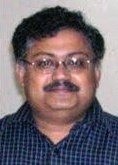Week 1:
Bipolar Junction Transistor; Physical Structure and Modes of operation,
Operation in Active Mode, circuit symbols and conventions,
BJT as an Amplifier, small circuit model,
BJT as a switch and Ebers Moll Model,
Simple BJT inverter and Second Order Effects.
Week 2:
MOS Transistor Basic,
MOS Parasitic & SPICE Model;
CMOS Inverter Basics-I
Week 3:
CMOS Inverter Basics(contd)
Power Analysis
SPICE Simulation-I
Week 4:
Biasing of MOS Amplifier and its behavior as an analog switch,
CMOS CS/CG/SF Amplifier Configuration,
Internal cap models and high frequency modelling,
JFET, structure and operation.
Week 5:
Multistage and Differential Amplifier,
Small Signal Operation and Differential Amplifier,
MOS Differential Amplier,
BiCMOS Amplifier with Active Load,
Multistage Amplifier with SPICE Simulation
Week 6:
s-domain analysis, transfer function, poles and zeros,
High Frequency Response of CS and CE Amplifier,
Frequency Response of CC and SF Configuration,
Frequency Response of the Differential Amplifier,
Cascode Connection and its Operation
Week 7:
General Feedback structure and properties of negative feedback,
Basic Feedback Topologies,
Design of Feedback Amplifier for all configuration,
Stability and Amplifier poles,
Bode Plots and Frequency Compensation
Week 8:
Ideal Operational Amplifier and its terminals,
Inverting and Non- Inverting Configuration,
As an integrator and Differentiator,
Introduction to Analog Computer,
Large Signal Operation of Op-Amp and Second order offsets.
Week 9:
Butterworth and Chebyshev Filters,
First and Second Order Filter Functions,
Switched Capacitor based filters,
Single-Amplifier Biquadratic Filters,
Second Order LCR Resonator.
Week 10: Combinational Logic Design
Week 11: Sequential Logic Design
Week 12: Clock Strategies for Sequential Design, Concept of Memory & its Designing-I

DOWNLOAD APP
FOLLOW US